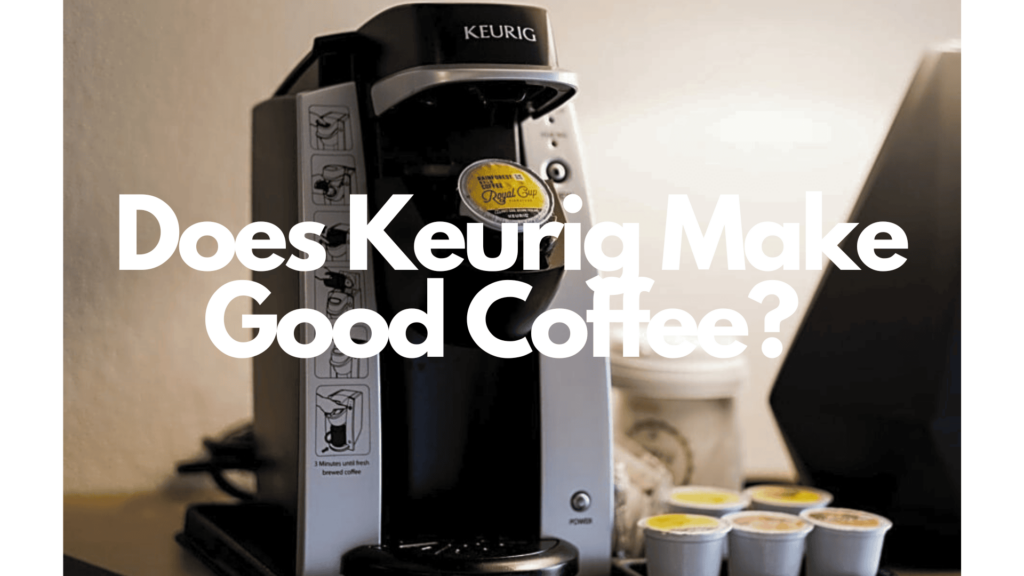For many people, coffee is that magic elixir that gets us through our days. If you're thinking about buying a Keurig, you're rightfully wondering if it makes good enough coffee for you to drink every day. Especially considering it's a simple, single-serve machine. So does Keurig make good coffee?
Keurig machines can make a good cup of coffee, especially for those who prioritize convenience and speed. However, “good” is subjective, and while many love the taste and convenience, some die-hard coffee experts might prefer other methods.
As with many things in life, it all boils down to personal preference. Keurig has revolutionized the coffee game with its convenient pod system, allowing for a quick caffeine fix without much fuss. While it might not rival your local barista's hand-crafted espresso, for many people, the balance of speed, ease, and flavor is great! But, as always, the best coffee is the one you enjoy the most, so lets get into the specifics to see if Keurig coffee is right for you.
What Makes a Coffee Good?
If you’re a coffee lover, have you ever found yourself sipping a cup and thinking, “Man, this is some good coffee!” only to have a friend take a sip and not feel the same? Well, you’re not alone. What makes “good” coffee can totaly depend on the person. A lot of it is deeply personal, intertwined with memories, culture, and individual palates.
For example, I know I’ve gotten into a friendly debate over taste preferences when it comes to my coffee because I favor light roasts over the richer, stronger dark roasts. Some friends swear by dark roast blends or they’re die-hard French Press or pour-over coffee fiends. I’m happy with a quick cup of light roast, so debates are common, and it’s fun to see other people’s point of view.
So how can we objectively evaluate coffee to find out what is “good” for most people?
The flavor and taste of coffee can be influenced by a host of factors, each making a big impact on the final sip. Let’s break it down:
- Bean Quality – Not all beans are created equal. The quality can vary based on where they're grown, how they get processed, and even the specific species of the bean. High-quality beans usually mean a tastier brew, and some people believe in this so strongly that they only drink and make coffee using a specific bean.
- Body/Mouthfeel – Have you ever noticed how some coffees feel thick and creamy, while others are more watery? That's the body or mouthfeel. A coffee's body can elevate the drinking experience, making it feel more luxurious or refreshing. This is why I love to go in and get a cappuccino as a treat once in a while. It feels luxurious and is the perfect way to relax.
- Brewing Method – Whether you're into French press, espresso, pour-over, or cold brew, the method you choose can greatly influence the flavor. It’s like cooking – the same ingredients can taste different depending on how you cook them, including cooking or brewing time.
- Consistency – No one likes an unpredictable coffee. If your favorite brew tastes different every time, it might not be considered “good” in your books. Consistency ensures you get that perfect taste with every cup. Chances are, you walk into your favorite coffee shop, and you know exactly what you’re going to order and how it tastes. You expect it to taste the same each time, and you’re disappointed if it doesn’t. For many people, consistency is key.
- Freshness – Like morning air or newly baked bread, fresh coffee beans play a pivotal role in the taste. Over time, coffee beans lose their flavor and can become stale, leading to a less-than-stellar cup, which is why there are so many die-hard fresh ground coffee bean fans.
- Roast Level – From light to dark, the roast level can drastically change the coffee's profile. While some enjoy the bright and tangy notes of a light roast, others might swoon for the deep, smoky flavor of a dark roast.
“Good” coffee is like art – subjective, personal, and deeply individual. While one person might rave about the tangy notes of a Kenyan coffee, another might find solace in the deep richness of a Sumatran brew. The key is to explore and find what feels right for your taste buds. BUT, we can still judge a coffee based on the above characteristics in order to recommend it to others. So…
Is Keurig Coffee Good Coffee?

CC: Photo by Priscilla Du Preez on Unsplash
Keurig, a name that’s become synonymous with convenience in the world of coffee. With the quick press of a button, you get a steaming cup of coffee, ready to kickstart your morning or provide that midday pick-me-up. But how does Keurig fare when we put its coffee under the microscope in terms of the core elements that define a cup’s quality? Let’s take a closer look.
Bean Quality
Keurig has a wide range of coffee varieties and brands, so bean quality can vary. Some premium brands might source high-quality beans for their pods, but not all do. Generally, the focus with Keurig pods is more on variety and compatibility rather than the absolute pinnacle of bean quality, and this can be a drawback for people who want a specific type of bean or blend.
Body and Mouthfeel
Keurig coffee tends to lean towards the lighter side in terms of body and mouthfeel. While it provides a decent texture, it might not offer the richness or creaminess that some coffee aficionados love. You can only pack so much flavor into the pods, and there are no special extraction methods with Keurig like you get with other machines, like Nespresso. Some argue that Keurig machines don't get their water hot enough for full extraction of the beans.
Brewing Method
Keurig's brewing method is fast and efficient, which is great for those mornings when I missed my alarm and found myself rushing around to get out the door and to work on time. But this speed doesn't allow for flavor customization like pour-over or French press offer. For me, it's a trade-off between time and taste, and I’m not a coffee snob so I don't need to alter the grind size, water temperature, bean quantity, etc of my coffee. But those who enjoy the art of coffee brewing will probably not like Keurig's simplicity.
Consistency
Here's where Keurig shines! Due to its automated process, you're likely to get a remarkably consistent cup every time you brew, as long as you use the same pods and cup size.
Freshness
Keurig's coffee comes in pre-packaged pods, which means the grounds have been sealed for a while before they reach your cup. While these pods are designed to keep the coffee fresh, they can't compete with the flavor you get from beans that were recently roasted and freshly ground moments before brewing. Again, this is where you have to decide if the convenience factor is a big enough draw and if you’re willing to sacrifice a little freshness.
Roast Level
Thanks to the broad variety of brands and options available, you can find Keurig pods ranging from light to dark roasts.
Keurig is undeniably the king of convenience in the coffee world. While it might not tick all the boxes for quality purists, for most people (myself included), a Keurig-brewed coffee tastes more than good enough, especially when factoring in the ease and speed of preparation.
So, if you're looking for a reliable and speedy coffee fix, Keurig has got your back. However, if you're on a quest for the epitome of coffee craftsmanship, you'll want to look for other options.
Related: Check out our guide to see if Keurig is worth the price.
Tips to Make Keurig Coffee Taste Better
If you're worried about Keurig coffee's flavor, there are some quick ways to get the most out of the coffee.
- Adjust the Brew Size – If you like a stronger taste, pick a smaller brew size on your Keurig. This means you'll get less water per gram of coffee, resulting in a bolder flavor.
- Experiment with Water-to-Coffee Ratios – Some machines let you adjust the amount of water per brew. If yours does, play around with it. Sometimes, just a little less water can make your coffee taste much more robust.
- Filtered Water – Coffee is primarily water, so its quality can make or break your brew. Using filtered water can reduce any off-tastes and ensure a cleaner flavor profile for your coffee. As a bonus, it helps reduce hard-water buildup.
- High-Quality K-Cups – All pods are not created equal. Spend a bit more on high-quality, premium brands or varieties that prioritize bean quality and flavor. These pods often deliver a richer and more flavorful coffee.
- Let it Brew a Bit Longer – Instead of immediately taking your mug away once the machine says it's done, let it sit for an additional 10 to 20 seconds. This can sometimes extract just a tiny bit more flavor.
- Preheat the Machine – Before you drop that pod in, run a cycle of just hot water. This cleans the machine and also ensures that your coffee gets brewed at the optimal temperature, which can help extract more flavor.
- Pre-warm Your Mug – Pour some hot water into your mug to warm it up before brewing your coffee. This ensures that your coffee stays hot for longer, and a warm mug can also enhance the aroma and taste.
- Regular Maintenance – Clean your Keurig regularly. Over time, coffee oils and residue can build up, affecting the taste of your brew. Regular descaling and cleaning can keep your coffee tasting fresh.
- Upgrade Your Creamer and Sweeteners – Instead of regular milk or sugar, consider using fresh cream, flavored syrups, or alternative sweeteners. A splash of high-quality creamer or a drizzle of organic honey can elevate your coffee experience.
- Use Reusable Pods with Your Own Fresh Coffee – Invest in a reusable K-cup and fill it with freshly ground beans of your choice. Not only is this a sustainable choice, but using fresh coffee can greatly enhance the flavor of your brew.
